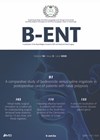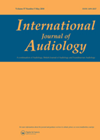
Journal Reviews
Conductive hearing loss and temporal processing
This Turkish study looked at the effect of using hearing aids on auditory temporal processing (the ability of the hearing system to process the temporal properties of a sound stimulus in a certain period of time) in conductive hearing loss....
Do personal listening devices cause cochlear synaptopathy?
Cochlear synaptopathy is a condition in which noise interrupts the synaptic communication between sensory inner hair cells and low spontaneous rate cochlear nerve fibres. Since these nerve fibres are associated with signal coding in noisy backgrounds, their disruption leads to...
Alcohol and hearing
Alcohol is a well-known central nervous system depressant. Individual reactions to alcohol might vary, but the connection between alcohol consumption and tolerance to loud noise or difficulties in communication in noisy environments are well-observed phenomena; for example, at evening parties....
Noise tolerance in the presence of speech
Noise is a common issue reported by people in reference to speech understanding, both for normal and hearing-impaired people. This study investigated how noise loudness, annoyance, distraction and speech interference impact noise tolerance in normal hearing people while listening to...
Speech in noise hearing difficulties
The phenomenon of speech understanding in noise in normal hearing people attracts the interest of researchers continuously. This study’s aim was to further explore the possible reasons behind these difficulties. The participants were 50 adults that reported having normal hearing...
Speech perception in the ageing population
Speech perception can present a challenge as we grow older. One of the factors responsible is, of course, hearing loss. Now research indicates that other non-auditory factors like cognitive decline may also contribute to difficulties in understanding speech. The authors...
Attitudes towards leisure noise
Noise is a very common reason for hearing loss. The question is whether young adults realise the danger of developing a noise related hearing loss. The aim of this study was to evaluate the attitude towards leisure noise and noise...
Directional microphones and speech
This study aimed to research how speech recognition, listening effort and localisation depends on hearing aids’ microphone configuration in people with moderate to severe hearing losses. Eighteen participants with sensorineural, symmetrical, moderate to severe hearing loss were tested. Participants were...
British English speech test for occupational hearing assessment
It is very important to properly assess occupational fitness for several occupations such as police officer, military personnel or fire fighter. The aim of this study was to develop a British English speech in noise (SiN) test as a tool...
Tinnitus and leisure noise
Tinnitus attracts large interest among researchers all over the world due to its negative psychological side-effects. Researchers from the National Acoustic Laboratory (NAL) tested life-time noise exposure and its influence on the tinnitus experience in 1435 young Australians from various...
Childhood speech processing in background noise
Normal childhood development of the auditory systems involves mapping sounds to meaning and the neural coding of speech. Children are often subjected to adverse listening environments such as high levels of background noise. This paper aimed to delineate the effects...
Hearing protection and hearing loss
This study examined the interaction of hearing protection for noise reduction and hearing loss with speech recognition performance. Forty five subjects with four hearing loss profiles were fitted with two different level dependent hearing protectors (circumaural and inserts) in two...
















